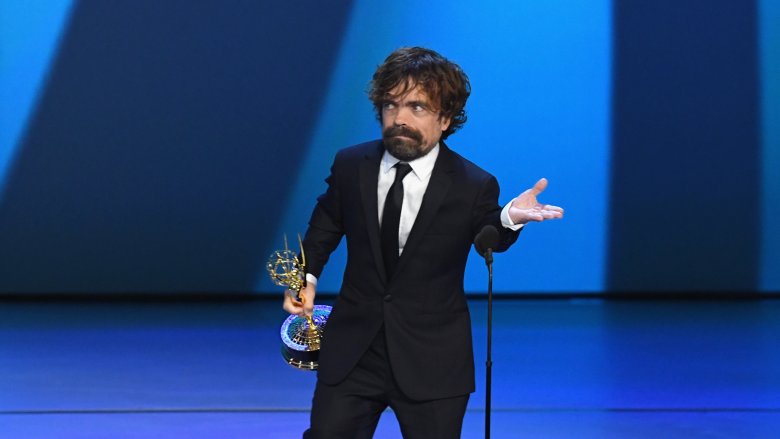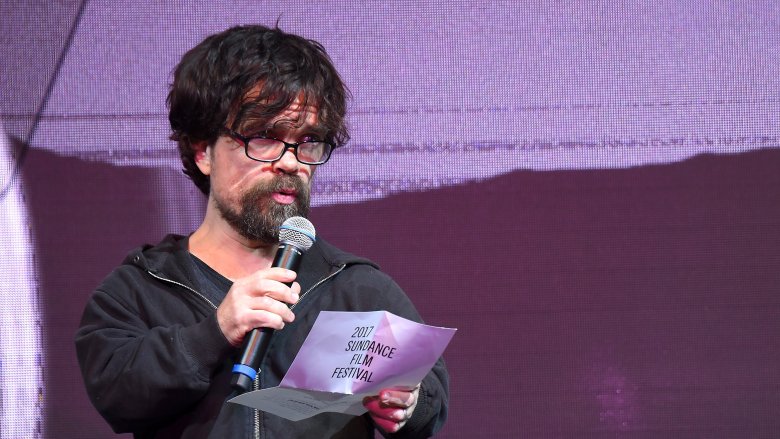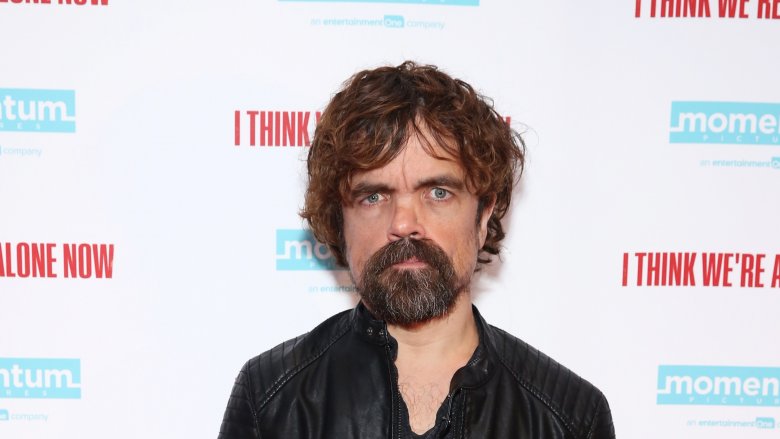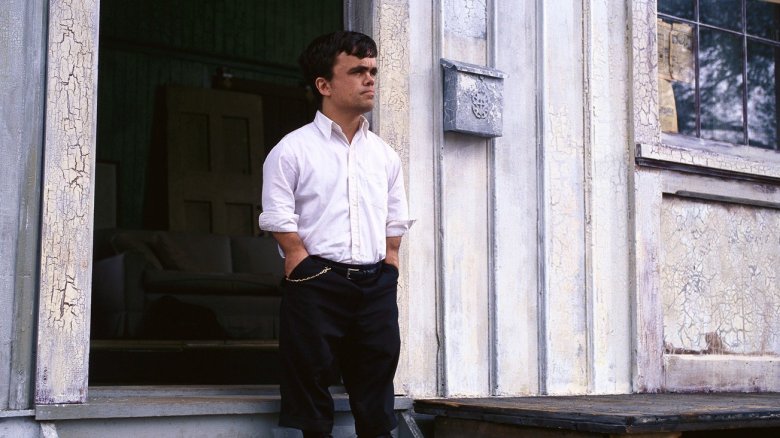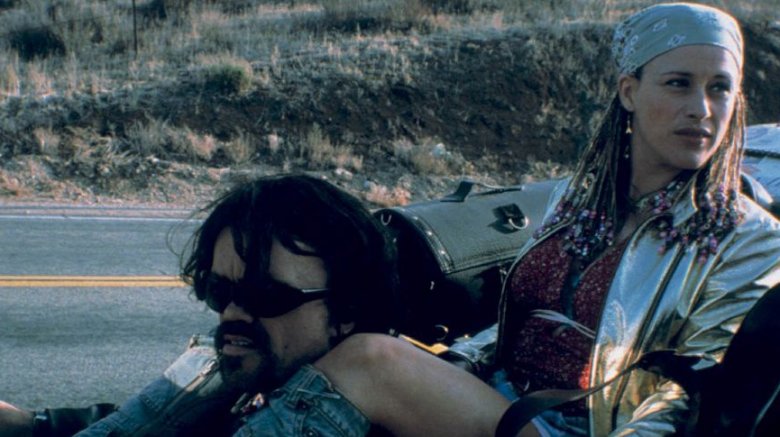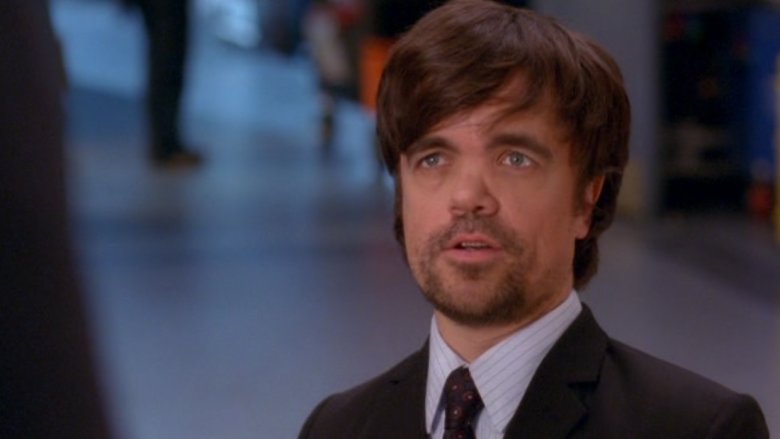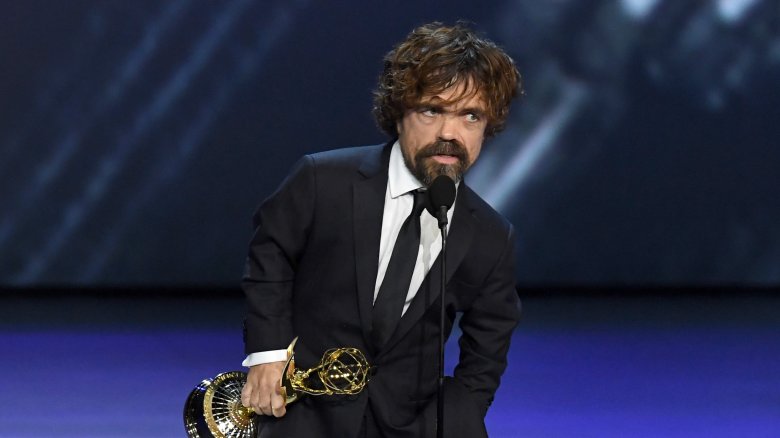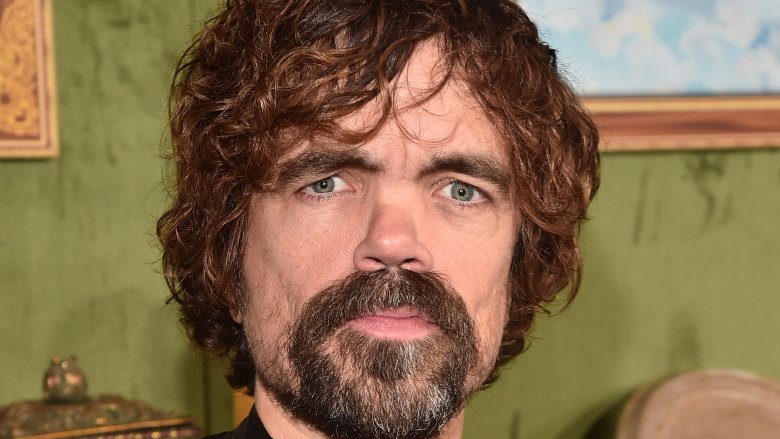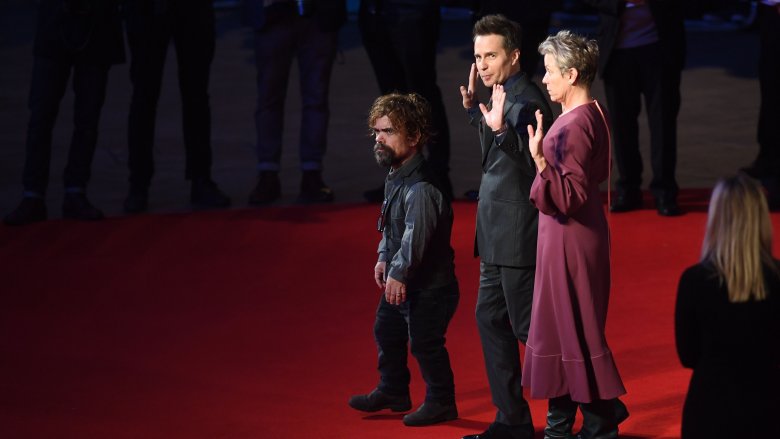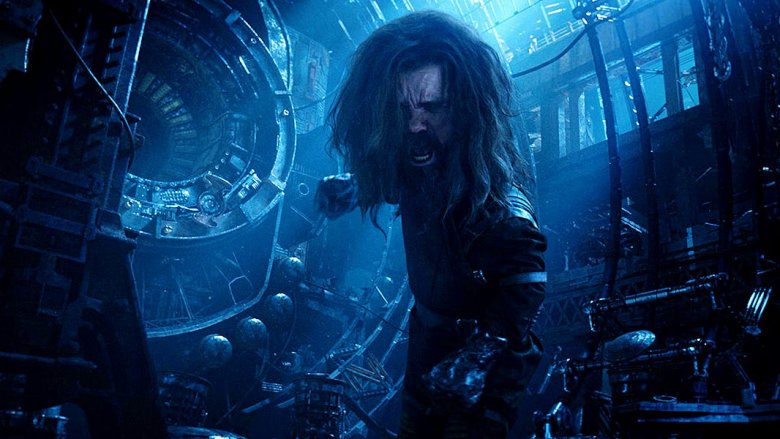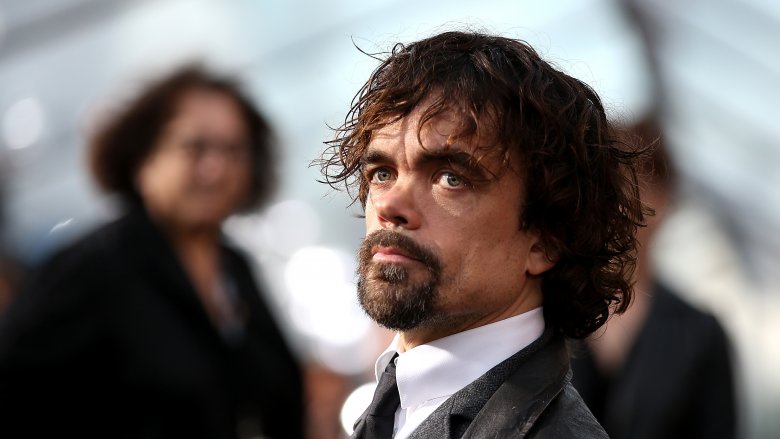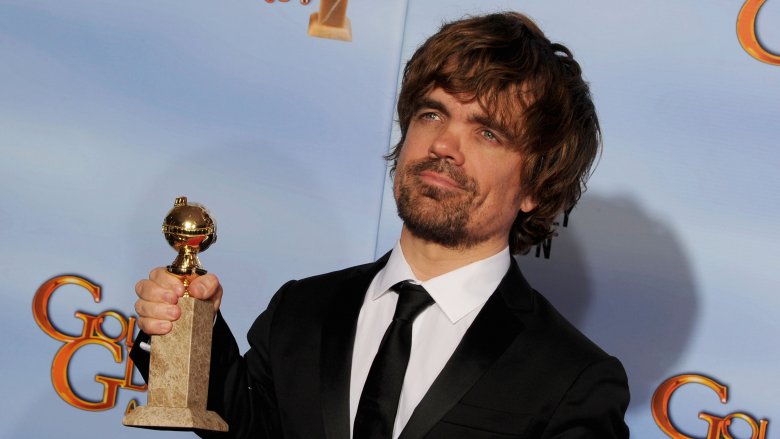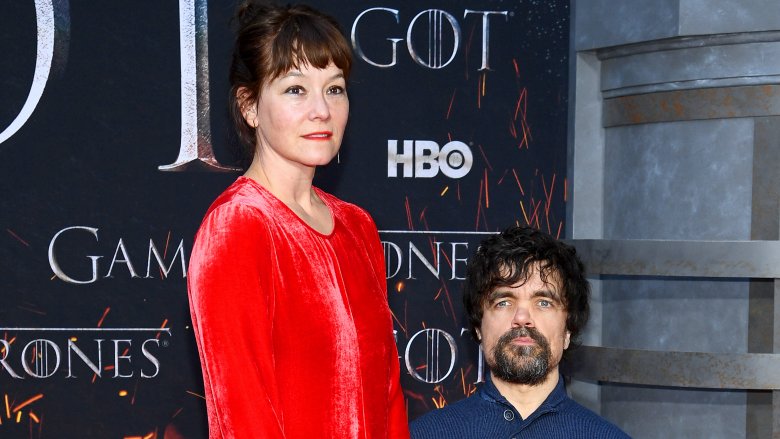The Untold Truth Of Peter Dinklage
Throughout Game of Thrones' wildly popular eight-season run, audiences marveled at the huge action set pieces, careful plotting, and gorgeous settings — but most of all, viewers fell in love with the characters, which was due in no small part to the cast's extraordinary performances. From low-born bastards to dragon queens to faceless assassins and fierce knights, the characters drew fans into the story, giving heart and soul to a larger saga about which of them would reign supreme and end up taking the Iron Throne of Westeros. Few of those characters captivated audiences like Tyrion Lannister, played to absolute perfection by veteran actor Peter Dinklage.
Though he might be small in stature, Peter Dinklage looms large over many of his contemporaries, carefully choosing roles that were respectful of his dwarfism. Throughout his storied career, he's performed on stage, showed off his comedic chops on television, and appeared in award-winning films, but most fans of Game of Thrones or Dinklage's other work may still not know the actor's whole history. Here's the untold truth of Peter Dinklage's career, story, and life.
Early struggles
Born in New Jersey in 1969, Peter Dinklage had a perfectly normal upbringing in an East Coast suburb, raised by a salesman and an elementary school teacher. His brother Jonathan seemed to be the performer of the family, attending music school (and eventually performing as a violinist in the hit musical Hamilton), but Dinklage caught the theater bug early after performing in a production of The Velveteen Rabbit and discovered that he thrived on the stage.
However, much later, after he graduated from Bennington College with a drama degree (having appeared in numerous productions at school), Dinklage was still struggling to find work. Despite starting a small theater company with his best friend from Bennington, playwright Jonathan Marc Sherman, he worked odd jobs until he could get his career off the ground, including cleaning pianos and answering phones. Eventually, even though they dreamed of mounting plays in their apartment's living room, they couldn't make rent, and came home to find the locks changed.
Refusing to be stereotyped
Peter Dinklage might have found success sooner had he taken roles that were focused on his size, but the actor has staunchly refused to take parts that mocked or diminished him and his dwarfism. Dinklage was more than aware that people would want to cast him as elves and dwarves in everything from commercials to fantasy series and struggled against it, refusing to take parts that he found offensive — even when it impacted his life negatively (Dinklage has said that he ate potato chips for dinner for years rather than play an elf in a Macy's commercial).
What Dinklage really wanted was to be in contention for roles that would go to any actor, and have his size matter less than his considerable talent, but when that didn't happen, he said it "fueled [his] desire" to keep living in an apartment without heating and keep working towards his eventual goals. Clearly, looking back, he made the right call.
Breakthrough Station
Dinklage's first film credit was in Living in Oblivion — alongside actors like Steve Buscemi, Catherine Keener, and Dermot Mulroney — in a brief appearance as an actor who was furious that he was playing a dwarf in a dream sequence, finding the entire situation unrealistic. Even in the aftermath of the film, Dinklage still had trouble getting an agent, but luckily, he ended up with a new opportunity before too long.
After appearing in a play written by director Tom McCarthy, the two became friends, and McCarthy took a second look at a script he was working on about a man who loves trains and ends up inheriting a small depot. McCarthy, who instinctively knew that Dinklage had what it took to be a leading man, cast him as the lead in an ensemble that included Bobby Cannavale and Patricia Clarkson. The Station Agent gave Dinklage the breakthrough he needed — it won the Audience Award at the Sundance Film Festival and earned him nominations at both the SAG and Independent Spirit Awards, officially kicking off the next chapter in his long career.
The Tiptoes controversy
Peter Dinklage's next high-profile project was also one of his most controversial to date. In 2003, he joined the cast of Tiptoes alongside Gary Oldman, Matthew McConaughey, Patricia Arquette, and Kate Beckinsale. The love story of Carol (Beckinsale) and Steven (McConaughey), the tale takes a turn when Carol gets pregnant and Steven is forced to reveal that he is the only member of his family without dwarfism. Most memorably, the film features Oldman, an actor who notably does not have dwarfism, as a dwarf who teaches Carol, whose baby may be born with dwarfism as well, what it's like to live life as a dwarf.
The concept seems problematic best and flat-out offensive at worst, especially considering that Dinklage, who actually has dwarfism, was shunted to a smaller role to allow Gary Oldman to play a dwarf. The film, which premiered at Sundance and ended up going straight to DVD, earned extraordinarily negative reviews from critics, but even so, Dinklage ended up defending it, saying that the original cut of the film was "gorgeous" until a different director was brought in, at which point it became exactly the kind of film he would never choose to take part in.
Comedic chops
Peter Dinklage has long been known for his strong dramatic work, but in several of his more high-profile roles, he's allowed plenty of jokes at his expense, showcasing a healthy sense of humor alongside strong comedic instincts. One of his biggest outings was inthe Will Ferrell holiday classic Elf, in which Dinklage, as a high-powered author, comes up against Ferrell's titular Buddy in a scene that culminates in a full-on fistfight between the two. The scene lets Buddy be the butt of the joke rather than focusing on Dinklage's stature, finding a successful way to let Dinklage shine, and he sought out more comedy work after that film proved to be a massive success.
He appeared as himself in the HBO series Entourage, which often cast real actors as themselves in the show's exaggerated, over-the-top version of Hollywood, but his funniest television role was undoubtedly on 30 Rock, on which he played an unlikely love interest to Liz Lemon (Tina Fey), who patted him on the head after mistaking him for a child. Even though the two genuinely hit it off, Dinklage, a successful and accomplished U.N. ambassador, quickly realized they only met because she thought he was a kid and left, concluding one of Lemon's most embarrassing romantic foibles.
Coaxed into Thrones
Peter Dinklage continued working steadily, finding parts in several films across a huge variety of genres, but his biggest part was just around the corner. Game of Thrones showrunners David Benioff and D.B. Weiss knew that the list of actors they would want to play one of the series' leading men, Tyrion Lannister, was basically nonexistent — it wasn't just that Dinklage was their first option, he was the only option.
Dinklage was extremely hesitant when it came to taking this life-changing role, particularly after a negative experience playing a stereotypical fantasy dwarf in Prince Caspian, but eventually, Benioff, Weiss, and Martin talked him into taking the role, stressing just how popular, smart, and complex of a character Tyrion really was. Luckily for everyone, Dinklage stepped into the role, which ended up making him an international superstar.
Similar scars
In the second season of Game of Thrones, Tyrion proves an unlikely hero during the massive Battle at Blackwater Bay, during which King's Landing, the capital of Westeros, is besieged by enemy forces and nearly toppled until Tyrion strategically uses wildfire to destroy most of the enemy fleet. However, when he makes his way onto the battlefield, he is immediately attacked by a soldier who turns out to be a hired hitman (by his own relatives, no less), and even though his squire bravely saves his life, his face is more or less split open, leaving Tyrion with a distinctive scar for the remainder of the series.
As it happens, Dinklage himself has a similar scar — back when he was the frontman for a punk band called Whizzy that was performing at the famous club CBGB's, he got kneed in the face during a set and ended up dabbing his face wound with a "dirty bar napkin," leaving him with a lasting souvenir that matches one of his most famous character's most distinctive characteristics.
Appeared in an Oscar-winning film
The 2017 film Three Billboards Outside Ebbing, Missouri, written by famous Irish playwright Martin McDonagh, focuses on a woman (Frances McDormand) who, after losing her daughter to a brutal rape and murder, lashes out against the local police department when they leave the crime unsolved. Alongside McDormand, the film starred Sam Rockwell, Woody Harrelson, John Hawkes — and of course, Peter Dinklage.
Dinklage appears as James, a proud citizen of Ebbing who gives an alibi to McDormand's character, Mildred, claiming they were on a date together when she was actually tossing Molotov cocktails into the police station. Though they do end up going oout, it ends pretty badly, with James leaving Mildred behind once he realizes she only went out with him out of pity. It's another great prestige role for Dinklage, especially considering the accolades the film garnered upon its release, between excellent reviews and a long list of awards and nominations.
Mjolnir? I hardly know her
It's amazing to appear in one worldwide phenomenon, let alone two — and Peter Dinklage is one of the few actors to manage this feat. Beyond his award-winning, full-series turn in Game of Thrones, he also made his mark in the Marvel Cinematic Universe as Eitri the Dwarf King, a giant dwarf who created some of the universe's most formidable weapons, including Thor's hammer Mjolnir.
During Avengers: Infinity War, when Thor, Rocket, and Groot arrive in Eitri's home, he reveals that Thanos forced him to craft the Infinity Gauntlet, which would later be used to "snap" half of all life out of existence, and then killed all of Eitri's friends and family anyway. Once Thor convinces him he can help to defeat Thanos, Eitri helps craft a weapon called Stormbreaker, which Thor hopes to use to take down Thanos once and for all. Dinklage's appearance was brief but memorable, proving invaluable to Thor in a moment of need when the god was left weaponless.
Fighting for animal rights
Since he was 16 years old, Dinklage has been a vegetarian, and as a celebrity, he's made sure to put his money where his mouth is. During his scenes on Thrones where he appears to be eating meat, he's actually eating substitutes like tofu, and ever since gaining international acclaim as Tyrion Lannister, he's advocated vegetarianism. Dinklage's public works include working with PETA for their Face Your Food campaign, which asks people to adopt vegan diets on ethical grounds.
He also spoke out about an issue specific to Thrones, responding to animal shelters seeing an increase in abandoned huskies from eager fans hoping to get direwolves of their own — and who ended up leaving the dogs behind once they proved too difficult to manage. Teaming up with PETA once again, Dinklage urged families to carefully consider whether they could handle a husky before adopting one, and to always get their dogs from shelters rather than from pet stores, proving he's every bit as conscientious as the secretly soft-hearted character he plays on Thrones.
A memorable dedication
Unfortunately, dwarves are typically the butt of some pretty crude jokes in television and film, and dwarf-tossing is a disturbingly common form, from the opening scene of The Wolf of Wall Street to several throwaway lines in the Lord of the Rings trilogy about people tossing the Fellowship's only dwarf. Despite being a stunt onscreen, it should come as no surprise that the real-life practice of dwarf-tossing can be fatal, a fact which Dinklage has addressed in the most public and admirable way possible.
Martin Somerset, a dwarf who died at the age of 42 after being tossed by a fellow drunken rugby fan, became the subject of Dinklage's Golden Globes acceptance speech in 2012, when Dinklage dedicated his award to Henderson and urged audiences around the world to Google him and his story. Dinklage has stressed that he doesn't want to be seen as a role model, but in speaking out against senseless violence directed at people with dwarfism, he's proving to be an important figure for communities across the world.
A theatrical family
Peter Dinklage's career is obviously thriving, but he's lucky enough to have a partner who works in the same field — and they've worked together. In 2005, Dinklage eloped with Erica Schmidt, a playwright and director based in New York City, and the two have since had two children and relocated to upstate New York, keeping their family out of the spotlight. Schmidt has an impressive career of her own, directing and writing several successful plays.
Dinklage is an accomplished stage actor, appearing in everything from Richard III (in the title role) to a more recent production of Cyrano (also in the title role). He and Schmidt teamed up for a production of Ivan Turgenev's A Month in the Country, which Schmidt directed and in which Dinklage appeared alongside Orange Is the New Black star Taylor Schilling. Dinklage has been open about his admiration for his wife's talent — now that he's finished with Game of Thrones, maybe they'll have a chance to work together again soon.
